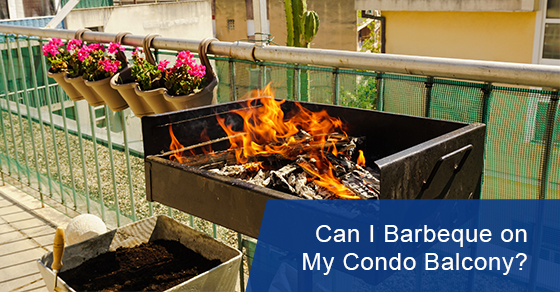
Can I Barbeque on My Condo Balcony?
Posted by on Jul 05, 2021 in
With summers so short in Ontario, you want to make the most of the warm weather. For Canadians, the call of the grill becomes hard to resist. In fact, come dinner time, chances are if you’re in a residential neighbourhood, you’ll smell that tempting meat grilling and be hard-pressed not to run out and grab a steak or burgers to throw on your own barbecue. However, not all of us have the luxury of barbecuing, thanks to bylaws. This includes condo owners. Here, we look at the legalities around condo balcony barbecuing and why it is probably not a great idea.
Individual Bylaws
One of the challenges of condo barbecuing is that each condo has its own bylaws. Although most will dictate barbecuing is not allowed, in some rarer cases it might be allowed. In fact, in even rarer cases, you might be provided an actual gas line to hook up your gas barbecue, usually for main floor units. However, your best bet is to either dig out your bylaw documents or speak directly to your management or board of directors to find out. It also depends on your municipality, but your condo bylaws take precedent.Why is barbecuing not allowed in condos?
There are many reasons that barbecuing on your condo balcony is not allowed. The main reason is the obvious one: it can present a fire hazard. This is an issue for condo corporations, as most won’t pay for insurance to cover fires caused by barbecue accidents. However, there is also consideration for your neighbours. The smoke from your barbecue can enter other people’s units due to the tight quarters of the balconies and their proximity to unit windows. Other people might not take too kindly to the smells of the food and smoke. You might even come into issues with municipal laws regarding the transporting of propane tanks. It’s actually illegal to carry your propane tank on the elevator. Last but not least, regulations even dictate the amount of distance a barbecue must be from openings, and this distance is quite tight. You need at least a foot of space from windows and doors, and three feet from appliance intakes. Considering the size of the average condo balcony, even if all the other rules don’t apply, this will knock you out of the running for grilling on your balcony.Why is condo insurance a factor?
Condo corporations have a duty to provide insurance, but they also have to maintain a budget. Most won’t be willing to invest in additional unnecessary insurance if they don’t have to. As a result, it is easier, safer, and more affordable to opt out of certain types of insurance. Insurance is also important for owners. You might not realize that your condo corporation insurance is designed to cover the main structure and common areas, not individual units. Therefore, your belongings are not covered in case of fire. Condo owners should have condo insurance, so you know that in case of a fire or other perils, your belongings inside the unit are covered. Condo insurance covers many different things including unit improvements, loss assessments, and living expenses should your unit be uninhabitable following the fire.How do I know how much coverage is needed?
It all depends on the perils covered by your condo corporation’s insurance. For example, if you experience water damage due to a building leak, then you might be covered under their insurance. Make sure you review their master policy and share it with our team so we can avoid you doubling up on insurance. Condos generally have two types of insurance:- All-in, which covers the fixtures in your unit such as plumbing, wiring, and appliances, but not your personal belongings.
- Bare walls-in, which does not cover anything contained inside your unit at all.

